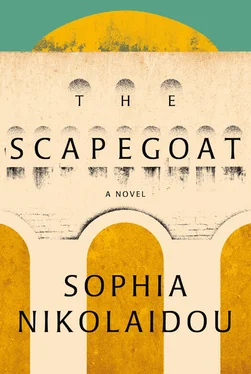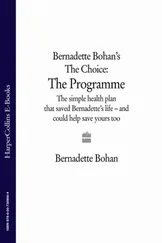The able and the incompetent were all in the same boat, they could all lose their jobs: the numbers simply didn’t add up. Friendships that blossomed during happier times withered overnight. Even smiles suddenly became suspicious, since anyone who smiled surely had a protector somewhere. They all slept and woke in the same haze of anxiety.
For a while the adults in his life left Minas to his own devices. They had other worries on their minds, more important problems to solve. Salary cutbacks, the unpleasant task of firing friends, taxes that were bringing everyone to their knees. At first Minas was taken aback by this sudden lack of interest, particularly on the part of his mother, who stopped keeping track of his lost study time and glued herself to the TV. She’s more interested in floating-rate bonds than in gerunds , he told his grandmother.
Evthalia was the only one who kept her cool in the chaos. She was infuriated by how the administration was handling the situation, and discussed their royal mess of a country with Teta over the phone and over morning tea with her girlfriends at Terkenlis. And then she would shake off these unpleasant thoughts with a this too shall pass —she wasn’t going to lose sleep over it, she had seen plenty of catastrophes in her day, wars, people killed, and she certainly wasn’t going to take too seriously this game of Monopoly unfolding before her eyes.
— It’s money, dear, it’s only money, she kept telling Teta.
— I don’t think you really understand, her daughter would shriek, on the verge of hanging up the phone.
Evthalia had learned to ignore Teta’s hysterics, which were only exacerbated by the news coverage, the front-page articles, and the confidential information Tasos brought home from work. She circled the date carefully on the calendar. On February 25, a Tuesday, Minas would present his research paper. Her grandchild took priority.
Evthalia put on her favorite knit suit, bordeaux colored, and painted her nails a pearly white. She’d had her hair done at the salon and was carrying a purse Minas had given her, though it wasn’t her style. Her grandson was the only person who gave her gifts. Modern bags with removable pouches, colorful bead necklaces that hung down to her navel, or more rarely an asymmetrical shirt or pareo. Teta had settled years ago on simply giving her money, which she considered more practical.
Tasos was fretting about being late for a meeting at the paper, but Teta shut him up with a look. In the elevator she grabbed his cell phone, put it on silent, and tossed it in her purse. Without his phone Tasos had no idea what to do with his hands. When they got out to the street, he put his arm around her.
Grandpa Dinopoulos came in his wheelchair. Elena had trouble getting him into the building, since there was no ramp, but the guard was friendly and the old man as light as a feather. They managed to get him into the lecture hall in plenty of time. Evelina had never seen her grandfather wearing a suit — even when they went to see him on New Year’s he always had on pajamas. He looked good in dark blue, with a handkerchief tucked into his breast pocket. His heavy glasses kept sliding down his nose and his right shoulder looked slightly hunched where there was too much fabric. But a good close shave had done wonders, and you could smell his cologne from a distance. Elena waved at Minas, who hurried to introduce Mr. Dinopoulos to his teacher.
Soukiouroglou had put up the announcement, but none of the other teachers had come. It was no time for experimentation, there was too much material to get through. The principal was preoccupied by the recent developments, and the guidance counselor couldn’t find a way to make Soukiouroglou’s initiative count in her file. The teacher’s proposal that students from other sections be invited was rejected. No one had any desire to babysit a bunch of teenagers outside of class.
The auditorium, the crown jewel of this old, palatial building, was an amphitheater designed by some enlightened architect eighty years earlier, before the task of building schools was turned over to contractors. Soukiouroglou led Minas’s parents into the higher of the two sections, to have a complete view of the events. Then he steered Evthalia to a seat in the front row beside Dinopoulos, who had been smiling at her from a distance. Evthalia gave a coquettish wave as she neared. A spark glinted under her eyelashes — the same spark that flashed in Minas’s eyes when he was misbehaving, when he was consciously disobeying the rules.
Evelina distributed the handouts and Minas plugged his thumb drive into the school computer. Soukiouroglou sat down in the audience and signaled for his student to begin.
Nineteen minutes and thirty-five seconds, timed on his cell phone. Minas’s classmates burst into applause. Some out of boredom, others out of interest, most because they considered it part of the process.
— You’re now free to ask questions, Soukiouroglou opened the floor.
Utter silence. The students had been trained to listen. Their years of schooling had taught them all kinds of useful things, but how to formulate questions was not one of them.
Soukiouroglou turned to Dinopoulos.
— As one of the individuals immediately involved in the case, might you want to ask something?
Evthalia nudged the old man, who licked his chapped lips.
— If you want to discuss the case of Manolis Gris, Dinopoulos answered, keeping his voice as steady as he could, by all rights you should acknowledge that making sure justice was served wasn’t the primary consideration. Or rather, while it may have been a concern for those individuals immediately involved, it certainly was not for the country as a whole. As with all vital decisions that affect large groups of people, you do the best thing for the greatest number. We did something for the sake of something else. It may be complicated to explain, but it’s self-evident in the moment of action. Which is why a neutral assessment of the events is the safest and most honorable approach. I agree with the young man’s method. It’s wise to present events as objectively as possible. No one can verify exactly what happened on the day of the murder, if you want my opinion, he concluded.
Soukiouroglou caught fire.
— In my class students are taught to take a position. Neutrality is a myth.
Dinopoulos shook his head. He’d never had much respect for high school teachers. They were all talk and no action. They lived at a remove from the tumult of the real world, in an alternate universe built of words and ideas. Evthalia with her practical mind was, of course, an exception. Be that as it may, the lawyer was tired of arguing the self-evident, as he’d been for doing decades.
— Neutrality, my dear sir, has existed since the creation of the world, he answered.
— Neutrality is a dangerous ideology. Pontius Pilate’s washing of his hands led a man to the cross, Souk said, unwilling to let it go.
— A man? You mean God incarnate, Dinopoulos corrected.
— Still.
Tasos, who had first-hand knowledge of Soukiouroglou’s back story, how and why he’d been expelled from the Faculty of Philosophy, checked the watch of the student sitting in front of him. There was no way they’d be out of there anytime soon.
He had spent an entire afternoon explaining to Teta why their child’s teacher had been kicked out of graduate school. Some people said his stance was full of integrity , but most called it idiotic and incomprehensible . If you roll around in the chaff, you’re sure to be pecked at by hens. The young scholar took on the lions — and got devoured.
And now old Dinopoulos was praising the virtue of neutrality before this man of all people. He was willing to admit that a conspiracy of good intentions , as he called it, had ruined the life of an innocent man. But he refused to lay the blame at anyone’s feet, and refused to try and identify the guilty party.
Читать дальше












